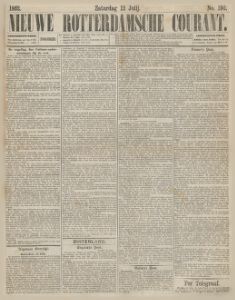About the day » Saturday July 12, 1862Calender converter
Born on Saturday July 12, 1862
- Adrianus van Polanen, Leiden († 1865)
- , Meer, Hoogstraten, Antwerpen, België († 1946)
- Anna Catharina Teeuwes, Gilze († 1862)
- Anna Daerden (Vreugdenburg), Maastricht, Limburg, Nederland († 1929)
- Albert Pieters Wijchers, Buitenpost († 1938)
- Alida Justina Van Commenée, Aarlanderveen († 1896)
- Angenietje Haasbroek, Katwijk († 1951)
- Andries Jans van Loon, Donkerbroek, Ooststelligwerf, Friesland, Netherlands († 1915)
- Anna Engelberta van der Staaij, Maassluis († 1867)
- Albert Wijchers, Achtkarspelen
Died on Saturday July 12, 1862
- Catharina Johanna Schwencke (79), Beverwijk, Noord-Holland, Nederland NL
- Arrien Wolters Greeve (2), Zuurbeek, Ambt Vollenhove
- Ceciliana Goossens (28), Clinge (NL)
- (85)
- Adriana Janna PONSEN (6), Opheusden
- Christiaan Ubachs (63), Meerssen
- arentje SCHAAP (58), den bommel
- Aegidius Josephus Gemmenig (43), Bocholtz (L
- Baukje Ennes (Boukje) van der Meulen (76), Dokkum, Friesland, Nederland
- Benedictus Vermeulen (66), Scheldewindeke
Source: Delpher (KB | national library) Newspapers from July 12, 1862 at Delpher
- Dagblad van Zuidholland en 's Gravenhage
- Algemeen Handelsblad
- De Noord-Brabanter : staat- en letterkundig dagblad
- Nieuw Amsterdamsch handels- en effectenblad
- De Tijd : godsdienstig-staatkundig dagblad
- Nieuwe Rotterdamsche courant : staats-, handels-, nieuws- en advertentieblad
- Rotterdamsche courant
- Utrechtsche provinciale en stads-courant : algemeen advertentieblad
- Nederlandsche staatscourant
- Provinciale Drentsche en Asser courant
Born on July 12
- 1852 » Hipólito Yrigoyen, Argentinian lawyer and politician, 19th President of Argentina († 1933)
- 1854 » George Eastman, American businessman, founded Eastman Kodak († 1933)
- 1855 » Ned Hanlan, Canadian rower, academic, and businessman († 1908)
- 1857 » George E. Ohr, American potter († 1918)
- 1861 » Anton Arensky, Russian pianist, composer, and educator († 1906)
- 1863 » Albert Calmette, French physician, bacteriologist, and immunologist († 1933)
- 1863 » Paul Drude, German physicist and academic († 1906)
- 1868 » Stefan George, German poet and translator († 1933)
- 1870 » Louis II, Prince of Monaco († 1949)
- 1872 » Emil Hácha, Czech lawyer and politician, 3rd President of Czechoslovakia († 1945)
Died on July 12
- 1804 » Alexander Hamilton, American general, economist, and politician, 1st United States Secretary of the Treasury (b. 1755)
- 1845 » Henrik Wergeland, Norwegian linguist, poet, and playwright (b. 1808)
- 1850 » Robert Stevenson, Scottish engineer (b. 1772)
- 1855 » Pavel Nakhimov, Russian admiral (b. 1802)
- 1870 » John A. Dahlgren, American admiral (b. 1809)
- 1892 » Alexander Cartwright, American firefighter, invented baseball (b. 1820)
- 1910 » Charles Rolls, English engineer and businessman, co-founded Rolls-Royce Limited (b. 1887)
- 1926 » Charles Wood Irish composer (b. 1866)
- 1926 » Gertrude Bell, English archaeologist and spy (b. 1868)
- 1929 » Robert Henri, American painter and educator (b. 1865)
Names that were popular for boys in 1862
Names that were popular for girls in 1862
Source: Wikipedia Historical events 1862
- Koning Willem III (Huis van Oranje-Nassau) was from 1849 till 1890 sovereign of the Netherlands (also known as Koninkrijk der Nederlanden)
- From March 14, 1861 till January 31, 1862 the Netherlands had a cabinet Van Zuijlen van Nijevelt - Loudon with the prime ministers Mr. J.P.P. baron Van Zuijlen van Nijevelt (conservatief-liberaal) and Mr. J. Loudon (liberaal).
- In The Netherlands , there was from February 1, 1862 to February 10, 1866 the cabinet Thorbecke II, with Mr. J.R. Thorbecke (liberaal) as prime minister.
- The Netherlands had about 3.6 million citizens.
- February 5 » Moldavia and Wallachia formally unite to create the Romanian United Principalities.
- April 7 » American Civil War: The Union's Army of the Tennessee and the Army of the Ohio defeat the Confederate Army of Mississippi near Shiloh, Tennessee.
- May 20 » U.S. President Abraham Lincoln signs the Homestead Act into law, opening 84million acres of public land to settlers.
- June 1 » American Civil War: Peninsula Campaign: The Battle of Seven Pines (or the Battle of Fair Oaks) ends inconclusively, with both sides claiming victory.
- August 6 » American Civil War: The Confederate ironclad CSSArkansas is scuttled on the Mississippi River after suffering catastrophic engine failure near Baton Rouge, Louisiana.
- December 31 » American Civil War: Abraham Lincoln signs an act that admits West Virginia to the Union, thus dividing Virginia in two.
Weather July 12, 1862
The temperature on July 12, 1862 was about 11.6 °C. There was 0.5 mm of rain. The air pressure was 0.5 kgf/m2 and came mainly from the south-southwest. The airpressure was 75 cm mercury. The atmospheric humidity was 90%.

 July 11, 1862
July 11, 1862